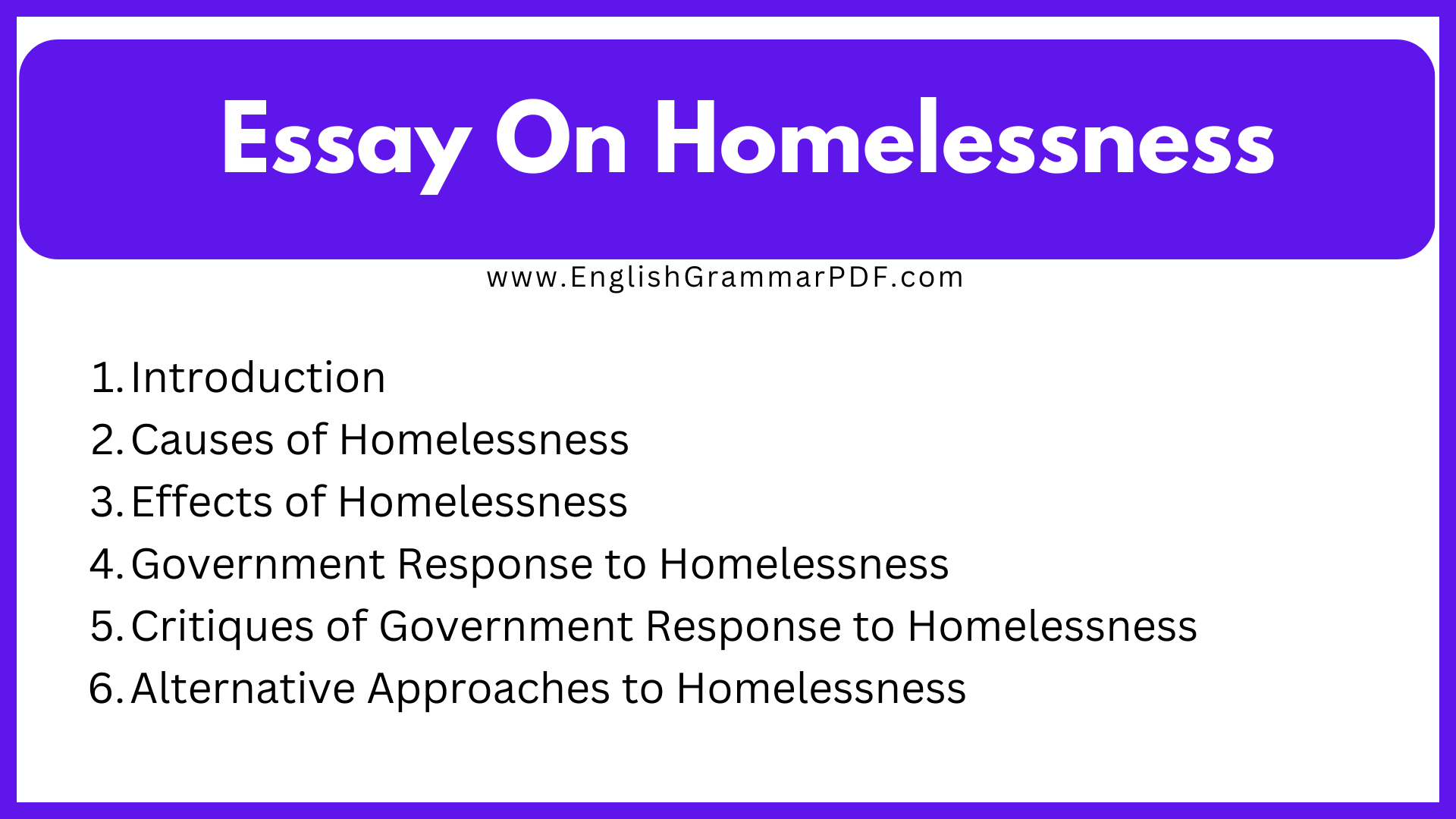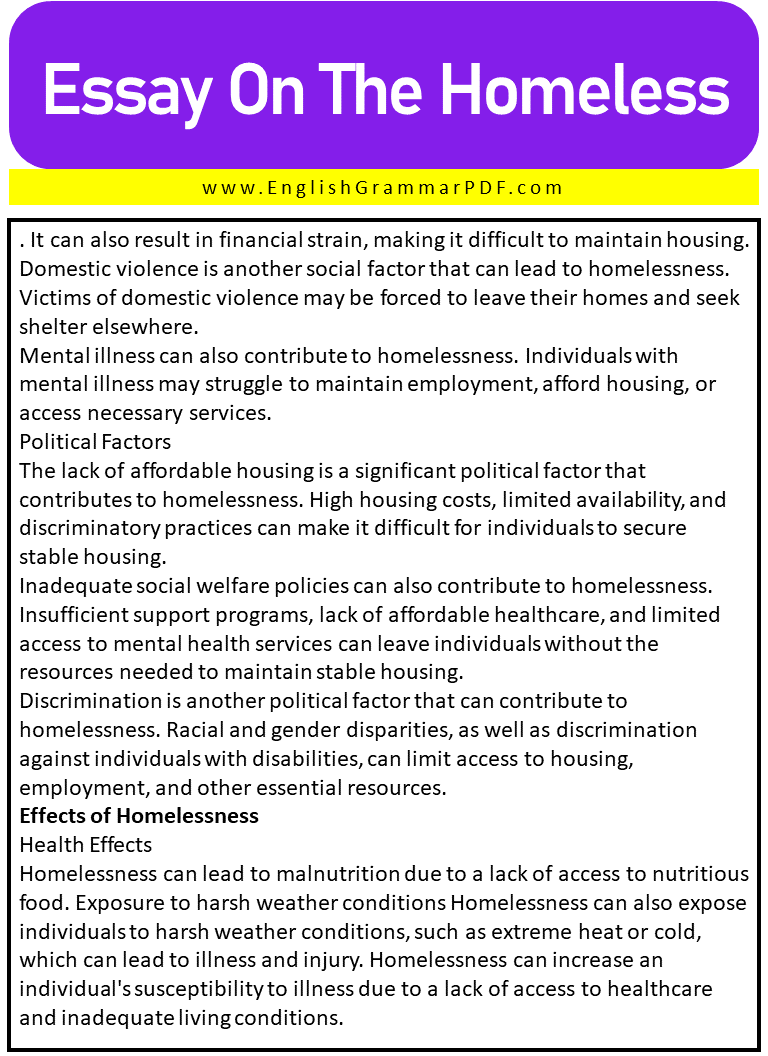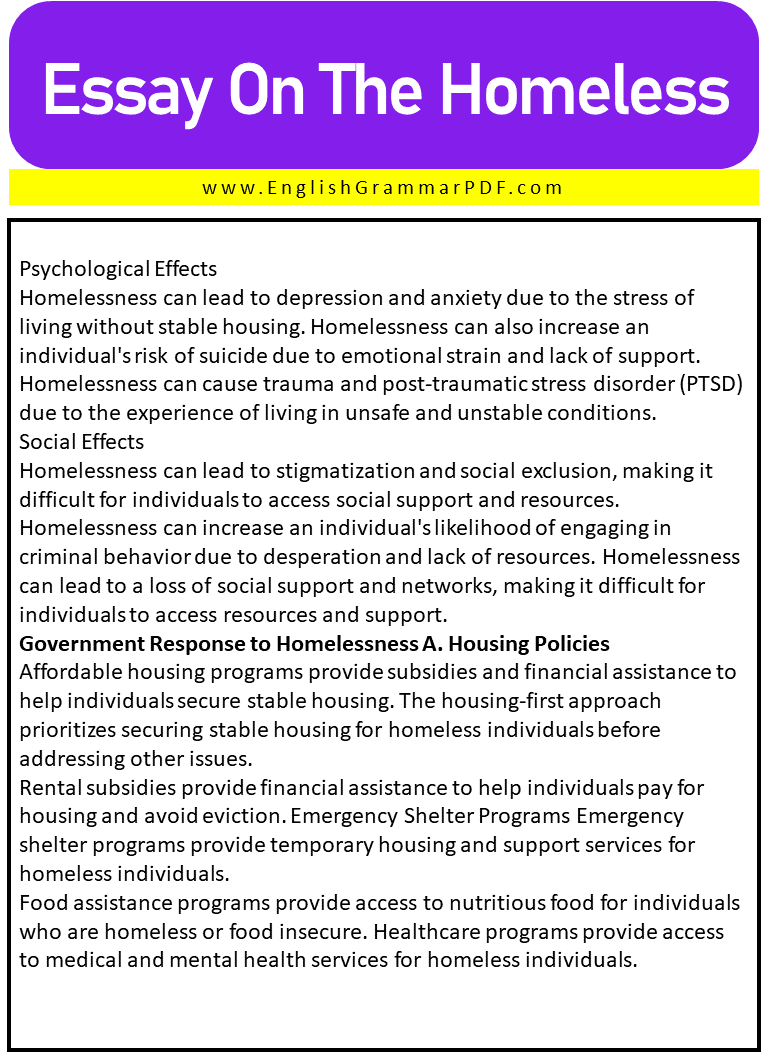Essay On The Homeless
Outline of Essay:
- Introduction
- Causes of Homelessness
- Effects of Homelessness
- Government Response to Homelessness
- Critiques of Government Response to Homelessness
- Alternative Approaches to Homelessness
Introduction
Homelessness is a persistent and devastating issue that affects individuals and communities worldwide. It is a complex and multi-faceted problem that requires a comprehensive understanding of its root causes, effects, and potential solutions. In this essay, we will explore the causes and effects of homelessness, examine the government’s response to homelessness, and analyze alternative approaches to addressing this pressing social issue.
Causes of Homelessness
Economic Factors
Unemployment is a leading cause of homelessness. The inability to find or maintain stable employment can make it difficult for individuals to afford necessities like housing and food. Low wages also contribute to homelessness.
Many individuals work in low-paying jobs that do not provide enough income to afford housing and other essential expenses. Poverty is a significant contributor to homelessness. Many people living in poverty lack the financial resources needed to maintain stable housing.
Social Factors
Family breakdowns, such as divorce or separation, can leave individuals without a stable home. It can also result in financial strain, making it difficult to maintain housing. Domestic violence is another social factor that can lead to homelessness. Victims of domestic violence may be forced to leave their homes and seek shelter elsewhere.
Mental illness can also contribute to homelessness. Individuals with mental illness may struggle to maintain employment, afford housing, or access necessary services.
Political Factors
The lack of affordable housing is a significant political factor that contributes to homelessness. High housing costs, limited availability, and discriminatory practices can make it difficult for individuals to secure stable housing.
Inadequate social welfare policies can also contribute to homelessness. Insufficient support programs, lack of affordable healthcare, and limited access to mental health services can leave individuals without the resources needed to maintain stable housing.
Discrimination is another political factor that can contribute to homelessness. Racial and gender disparities, as well as discrimination against individuals with disabilities, can limit access to housing, employment, and other essential resources.
Effects of Homelessness
Health Effects
Homelessness can lead to malnutrition due to a lack of access to nutritious food. Exposure to harsh weather conditions Homelessness can also expose individuals to harsh weather conditions, such as extreme heat or cold, which can lead to illness and injury. Homelessness can increase an individual’s susceptibility to illness due to a lack of access to healthcare and inadequate living conditions.
Psychological Effects
Homelessness can lead to depression and anxiety due to the stress of living without stable housing. Homelessness can also increase an individual’s risk of suicide due to emotional strain and lack of support. Homelessness can cause trauma and post-traumatic stress disorder (PTSD) due to the experience of living in unsafe and unstable conditions.
Social Effects
Homelessness can lead to stigmatization and social exclusion, making it difficult for individuals to access social support and resources. Homelessness can increase an individual’s likelihood of engaging in criminal behavior due to desperation and lack of resources. Homelessness can lead to a loss of social support and networks, making it difficult for individuals to access resources and support.
Government Response to Homelessness A. Housing Policies
Affordable housing programs provide subsidies and financial assistance to help individuals secure stable housing. The housing-first approach prioritizes securing stable housing for homeless individuals before addressing other issues.
Rental subsidies provide financial assistance to help individuals pay for housing and avoid eviction. Emergency Shelter Programs Emergency shelter programs provide temporary housing and support services for homeless individuals.
Food assistance programs provide access to nutritious food for individuals who are homeless or food insecure. Healthcare programs provide access to medical and mental health services for homeless individuals.
Public education campaigns raise awareness about homelessness and advocate for policy changes and increased support for homeless individuals. Community mobilization involves building partnerships and engaging with community members to address homelessness and provide support to homeless individuals. Non-profit organizations provide a range of support services for homeless individuals, including housing assistance, healthcare, and job training programs.
Critiques of Government Response to Homelessness
Critics argue that government responses to homelessness are often underfunded, making it difficult to address the root causes of homelessness and provide necessary support services. Critics also argue that government responses to homelessness are often hindered by bureaucratic red tape and inefficient systems. Critics argue that there is often a lack of coordination between different agencies and organizations involved in responding to homelessness, resulting in gaps and inefficiencies in the support provided.
Alternative Approaches to Homelessness
Mutual aid and solidarity networks involve building community-based networks of support to address homelessness and provide necessary resources and services. Housing cooperatives involve creating community-based housing arrangements that prioritize affordability, sustainability, and communal support. Community land trusts involve creating community-owned and managed land and housing, prioritizing affordability, sustainability, and community-based decision-making.
Conclusion
Homelessness is a complex and multi-faceted issue that results from economic, social, and political factors and has significant health, psychological, and social effects on individuals and communities. Alternative approaches to homelessness, such as mutual aid and solidarity networks, housing cooperatives, and community land trusts, offer innovative and community-based solutions that prioritize affordability, sustainability, and communal support. It is important to continue exploring and implementing these approaches to effectively address homelessness and provide necessary support and resources to individuals and communities in need.
FAQs
Who is most at risk of homelessness?
Those who are most at risk of homelessness are individuals and families who experience poverty, unemployment, mental illness, and social or political marginalization.
How many homeless are in the world?
There is no accurate estimate of the total number of homeless individuals worldwide, but the United Nations estimates that there are at least 150 million homeless people globally.
What is a good term for the homeless?
An alternative word for homeless is “houseless,” which emphasizes the lack of access to stable housing rather than defining individuals by their current living situation.
Download the Pdf of the Essay On Homeless






Read More Essays:


